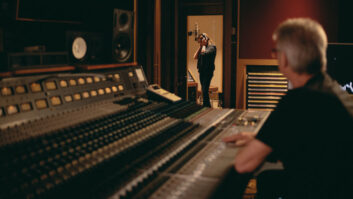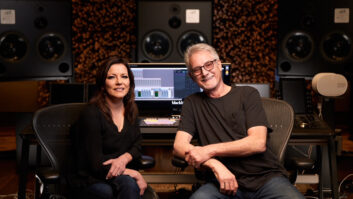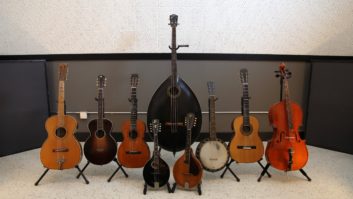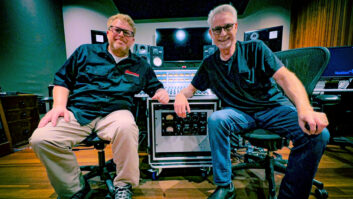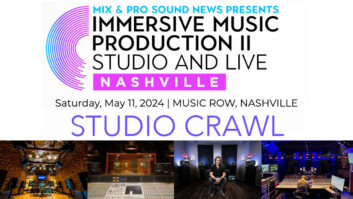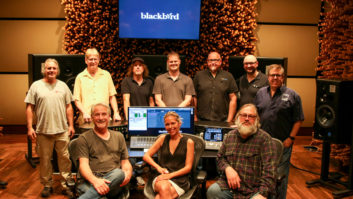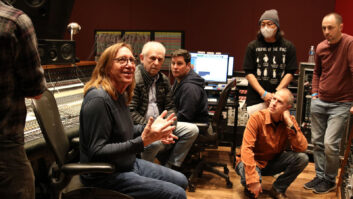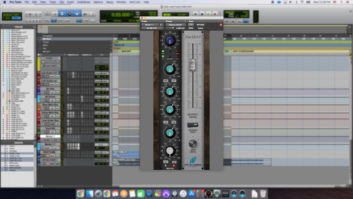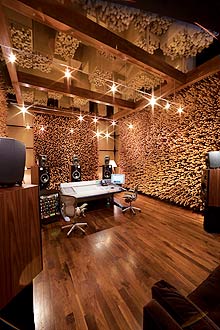
There’s something about Blackbird Studio. Producers pop in and out (some of them have their own rooms), and talent comes and goes at all times of day, passing each other in the hallways twisting through the six main rooms. You’ll find 24-track tape machines, 8-track/2-inch machines and 16-track/2-inch machines, which are currently in use for the Kings of Leon project. Vintage guitars, vintage amps and vintage-vintage mics are everywhere you turn. Every room is filled.
The George Massenburg room, with its number theory-based diffusion scheme, Digidesign ICON and ATC monitoring
Photo: Max Crace
There’s a buzz about the place, the same kind of vibe most likely felt at places like Power Station and Hit Factory in their early New York days. Or Record Plant and The Village in L.A. any number of times during the past 40 years. Or at Abbey Road before it became a legend.
In the past 18 months alone, Blackbird has hosted sessions for the White Stripes and The Raconteurs, Keith Urban, Brad Paisley, Bon Jovi, Kid Rock, Vince Gill, Martina McBride, Mariah Carey, Faith Hill, Carrie Underwood, Taylor Swift, Rascal Flatts, the Dixie Chicks, Jimmy Buffett, Jamie Foxx, Kenny Chesney, Tim McGraw, Garth Brooks, Dolly Parton, Randy Travis, Michael Bublé, Michelle Branch and more. Producers and engineers spotted behind the boards include Justin Niebank, George Massenburg, Dann Huff, Tony Brown, Ethan Johns, Richard Dodd, Niko Bolas, Rob Cavallo, Peter Asher, Phil Ramone, Jeff Balding and countless others, some of them pictured on this month’s cover, shot April 17, 2008, in Studio A.
“I was having dinner with Niko Bolas and Josh Leo the other night,” says Niebank, who has a semi-permanent residence in the SSL 9K-equipped Studio F. “They were telling stories about L.A. in the ’70s and New York in the ’80s, and I started thinking, ‘This is the kind of place they will be telling stories about in 20 years. This is the type of place where you bump into each other and share things.’”
It’s hard to believe that a little more than six years ago, Blackbird didn’t even exist.
A BRIEF HISTORY
You can’t really understand the rapid growth and success of Blackbird without at least a small sense of its owners, Martina and John McBride, the former a vocal powerhouse and country superstar and the latter a force of nature with a passion for music and audio. Raised in and around Wichita, Kan., out of high school, John McBride was denied an SBA loan for a recording studio but approved for a live sound system company. “Best thing that ever happened to me,” John McBride says today. After years of rental and mixing regionally, he met Martina, married soon after and the two headed to Nashville on New Year’s Eve 1989 with a semi full of gear.
His small P.A. company, MD Systems, hit it big with Garth Brooks in the early ’90s, and in 1997 McBride sold to Clair Bros. (He still runs the Nashville operation.) Soon after, he started feeling the studio itch, and by 1999 was learning Pro Tools and starting to order equipment that had no home other than his basement. A Neve 80 Series landed on the loading dock at Clair, along with an API console, a Fairchild, an 1176, a pair of 24-tracks and the first of his many Telefunken 251s. (Today he owns 29, along with 10 250s.)
“I remember the day John called up and said he wanted a vocal booth in his garage,” says Vance Powell, general manager of Blackbird and an engineer himself. “We started off with a Pro Tools system in his basement. He learned it, bought some more equipment, and today you’re standing in the vocal booth!” he says with a laugh, spreading his arms to encompass the block-long Blackbird complex.
On January 15, 2002, his 44th birthday, McBride closed on a small property in Berry Hill, Creative Recording, home to hits from The Judds, Kenny Rogers and others. It was a George Augspurger room from the ’70s, with a compression ceiling. During the next year, the room was enlarged, Augspurger was brought back in to retune, the Neve was reconditioned and the live room was expanded. “He still was thinking of just one room and an edit room,” recalls Powell. “He wanted a place where he could really raise the level of recording for Martina.”
During the past six years, McBride has added rooms and whole wings, all the while amassing one of the largest collections of vintage gear in the U.S. Blackbird now encompasses six main studios, along with edit bays, offices, storage, lounges and one amazing hydraulic-lift variable chamber. Two rooms have API Legacys, including the largest API ever built recently installed in D and used in the past year by the White Stripes, The Raconteurs and now Kings of Leon. Studio A, the original room, houses the Neve 8078 and was being employed by Martina McBride, with Dann Huff co-producing, on the day Mix was there. The other studios house the 9K and a couple of Digidesign ICONs, including a rolling model in Massenburg’s custom four-wall diffusion track/mix/overdub room. A Trident Series 80 B is at the warehouse, “just in case.” All monitoring is ATC.
Beyond the studios, McBride has opened up space for manufacturers, including Korby Microphones and GML Inc. And he runs a successful rental operation, with a massive collection of rare outboard gear, vintage instruments and even rarer microphones.
THE COLLECTOR AND THE COLLECTION
“I love microphones,” McBride smiles, sipping a Dr. Pepper over Sonic Burger ice. “The right mic on the right input is just magic. And you can solve about 99 percent of your problems by changing up the mic, either by placing it somewhere else or swapping it out. When you have the right mic, you don’t need EQ. I just found this combination I love for electric guitar overdubs: an RCA BK 5A at the speaker through an RCA BA11A mic pre into a Fairchild 660 — pretty incredible.”
He now owns 29 Telefunken 251s and 10 250s; 18 AKG C24 microphones, including serial number 001; two of the “exceedingly rare” Hiller M59 microphones used at Abbey Road; 40-plus Telefunken, Neumann and Church U47 microphones; 36 RFT 7151 bottle mics from the ’30s used on Martina McBride’s Timeless record; and he’s recently turned his attention to more Neumann KM54s, AKG C28s and Telefunken Ela M 201 ribbon microphones.
He also owns dozens of Fairchilds and 1176s for rental, along with 40-plus Pultec EQs, tube and solid-state Decca compressors, ADR/Compex compressors and limiters, Pye compressors, Cooper Time Cubes, EMT 240 and 250 reverbs, Publison Infernal Machines, 2x Dumble 100-watt Overdrive Special Guitar amps, UREI 850 compressors, 100-plus Telefunken tube mic pre’s, RCA OP6 mic pre’s, RCA BA11A mic pre’s, Gates Sta-Level compressors, Neve 33609A and 2254 compressors, Eventide 2016 reverbs, Cyclosonic Panners and enough band gear to set up for 30 bands simultaneously.
The Beatles fan in McBride is particularly proud of the 16 channels of EMI Mastering EQ and compressors to go with his EMI Curve Bender EQ. “They built this stereo 3-band so that any tape that came in from another studio would sound like Abbey Road. It’s incredible,” he says.
Blackbird also makes hundreds of guitars available for recording, everything from McBride’s 1914 Martin to 30-plus pre-CBS Strats and Teles, to 1959 and 1960 Les Paul Flame Tops, the latter of which “was all over Keith Urban’s last record.” He also owns a 1949 Gibson J200 and was thrilled when Cowboy Jack Clement came in last year with a 1950 model that he had bought new. “I loved that,” McBride says. “He’s had that damn guitar for 57 years and he’s still playing it. Nothing bothers me more than guys who buy guitars and put them behind glass. Guitars need to be played, and they need to be played on hit records.
“People who love music will find their way here,” he continues. “I’ll admit it, when I started this place, 25 percent of my motivation was the fact that Nashville has been treated like a stepchild in the industry for a long time. And we’re sitting here with the greatest writers, producers, engineers and artists in the country. At Blackbird, we have an amazing team — from our head tech Richard Ealey to our co-managr and head booker, Scott Phillips. All we care about is audio and vibe, and all we’re looking for is to inspire those players, producers, engineers and artists.”
Engineers and producers who visit Nashville inevitably leave there talking about the pro studios, and the monster players, as well as the competitive yet supportive community. Niebank, a ’90s transplant from Chicago, takes talks about both Blackbird and Nashville at large. “We have the best studios, the best engineer pool and the best studio musicians in the world — period. And they’re making a living. They’re really playing drums, and I’m not overdubbing guitar! Imagine that. There’s this overall spirit in town that we’re all shooting for the best possible music together.”
